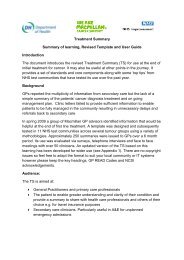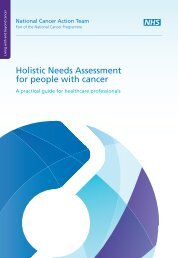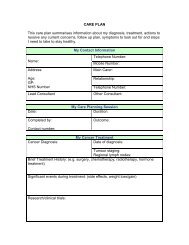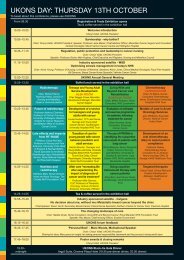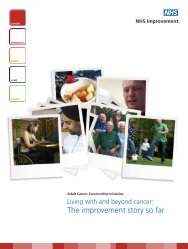HOPE Protocol [PDF, 420KB] - National Cancer Survivorship Initiative
HOPE Protocol [PDF, 420KB] - National Cancer Survivorship Initiative
HOPE Protocol [PDF, 420KB] - National Cancer Survivorship Initiative
Create successful ePaper yourself
Turn your PDF publications into a flip-book with our unique Google optimized e-Paper software.
Self-Management Programme for Survivors of Breast <strong>Cancer</strong><br />
Birmingham Service Improvement Project <strong>Protocol</strong><br />
<strong>National</strong> <strong>Cancer</strong> <strong>Survivorship</strong> <strong>Initiative</strong>, Macmillan <strong>Cancer</strong> Support<br />
1. Background<br />
1.1. Introduction<br />
In the UK, there are an estimated two million cancer survivors, and this is expected to rise<br />
annually by more than 3% (KCL, 2008). There are currently limited support services<br />
available for people who have completed their primary treatment for cancer, and are living<br />
with and beyond cancer. This includes not only patients in remission, but also patients who<br />
may now live for many years with metastatic disease undergoing repeat cycles of treatment.<br />
The <strong>Cancer</strong> Reform Strategy (Allberry, 2008) highlights the need to commission services to<br />
support patients who may be dealing with the long-term consequences of cancer and the<br />
enduring effects of cancer treatments.<br />
The Self-Management Workstream of the <strong>National</strong> <strong>Cancer</strong> <strong>Survivorship</strong> <strong>Initiative</strong> (NCSI) has<br />
agreed the development of national cancer survivorship follow-up models for pilot testing of<br />
self-management support for survivors who will be at different stages of living with or beyond<br />
a diagnosis of cancer. This will be achieved as part of an NHS Improvement test community<br />
for new survivorship services within Birmingham East and North PCT, Good Hope Hospital,<br />
and Pan Birmingham <strong>Cancer</strong> Network. The programme will be offered to patients who have<br />
completed their treatment for primary breast cancer, as part of testing the redesign of the<br />
pathway for cancer follow-up and support.<br />
Self-management programmes are offering greater utility in the current climate of increased<br />
numbers of people living with chronic long-term conditions. Indeed, chronic disease selfmanagement<br />
has been shown in the US, Canada, and the UK to be effective on both a<br />
patient and health service level (Lorig et al., 1999; Holroyd et al., 1986; Lorig, Mazonson,<br />
and Holman, 1993; Watson et al., 1997).<br />
1.2. Self-Management Programmes<br />
The leading self-management programme is the USA-developed Chronic Disease Self-<br />
Management Program (CDSMP), a community-based generic programme applicable to all<br />
chronic conditions (Lorig et al., 1999). The CDSMP is designed around self-efficacy theory<br />
(Sieving et al., 1997; O‘Leary, 1985), with confidence in one‘s abilities to perform specific<br />
behaviours being one of the key factors in successful health behaviour change (O‘Leary,<br />
1985). In a five-year research project, the CDSMP was found to improve healthy behaviours<br />
(i.e. exercise, cognitive symptom management, coping, and communications with<br />
physicians) and health status (i.e. self-reported health, fatigue, disability, social/role<br />
20/08/09<br />
2


![HOPE Protocol [PDF, 420KB] - National Cancer Survivorship Initiative](https://img.yumpu.com/32566432/2/500x640/hope-protocol-pdf-420kb-national-cancer-survivorship-initiative.jpg)
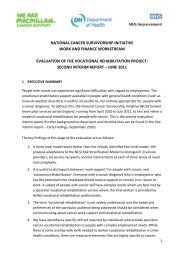
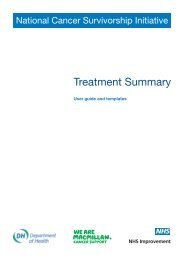
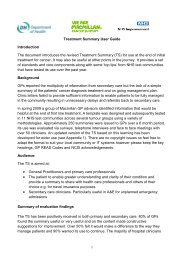
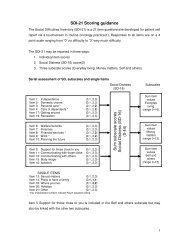

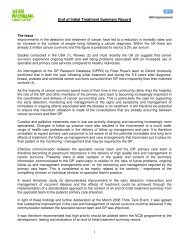
![Download the how to guide [PDF] - Macmillan Cancer Support](https://img.yumpu.com/47067428/1/184x260/download-the-how-to-guide-pdf-macmillan-cancer-support.jpg?quality=85)
